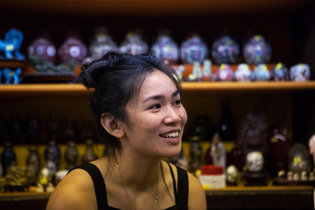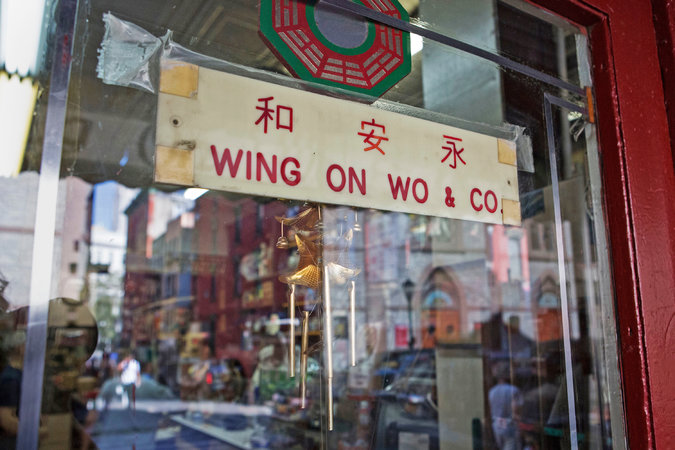“They are leaving a big pile of cash on the table for their heritage,” said the broker, Will Suarez, a director at the commercial real estate company Cushman Wakefield.

Wing on Wo’s salvation appeared in Mei Lum, 26, the second-youngest of the family’s five grandchildren. She turned down acceptance to graduate school at Columbia University last May to interrupt the store’s sale and offered to take it over. She is now reinventing the shop, molding it into a community space that operates against the backdrop of Chinatown’s history. The antiques will become secondary; instead, she envisions a forum for panels on issues like neighborhood politics, exhibitions for local artists and a coffee shop. Ms. Lum held an event recently at the store on the neighborhood’s gentrification, and a planned panel will include influential businesswomen from Chinatown. She calls her concept the “W.O.W. Project.”
Ms. Lum was traveling in China when her father in New York called to inform her that her grandparents, Nancy and Shuck Seid, 86 and 92, were selling the shop. Mrs. Seid, who inherited the shop from her father’s family, managed it for decades, while Mr. Seid worked for years as a clerk in the New York Police Department’s Fifth Precinct in Chinatown. Mrs. Seid said she was exhausted and wanted to spend time with her aging husband, who now speaks little and is in a wheelchair.
Advertisement
Continue reading the main story
“Every little thing becomes a problem when you get old,” Mrs. Seid said, surrounded by family at Wing on Wo on a recent afternoon. “You don’t want to deal with things anymore. So I told them: Sell the damn thing.”
Mei’s father, Gary Lum, 61, sat beneath the shop’s dusty industrial ceiling fan. “On the one hand, you want to walk into the sunset,” he said. “But you also have to consider what it means to close something like this after all these years.”
Ms. Lum’s early fascination with Chinese history set her apart from the other grandchildren. Growing up in Chinatown, she relished afternoons with her tradition-minded grandfather, who taught her Cantonese and the teachings of Confucius. Any skepticism from friends about passing up a prestigious education, she said, weighed on her only momentarily.
“The wheels were turning. It was on the market. I had to act fast,” Ms. Lum said. “You’re supposed to get all these shiny things and then go onto better things, right? But I had to think about my impact. How can I make a global impact if I haven’t even had an impact on my own community? Graduate school will always be there. This won’t.”

Wellington Chen, the director of Chinatown’s business improvement district, pondered the shop’s new chapter and said Ms. Lum was challenging a troubling neighborhood narrative. “These children get the degree or the big job or the car, and then no one ever comes back,” he said. “That is the problem we have with young people in Chinatown now. Can she make the shop relevant? We have to see. But I applaud her for coming back, because no one is coming back.”
Ms. Lum’s new vision for Wing on Wo, ironically, resembles the store’s original incarnation over 100 years ago, when Chinatown spanned just Pell, Doyers, Bayard and Mott Streets, and was populated by people who felt very far from home.
General stores like Wing on Wo were crucial hubs in this early village-like stretch. They sold tastes of home like dried fish, herbs and tofu, but they also operated as social clubs, representing Chinese villages and counties, and provided mail and money-wiring services.
Ms. Lum’s great-great-grandfather, Walter Eng, opened Wing on Wo at 13 Mott Street, opposite the shop’s current location (it moved in 1925). It was a dimly lighted place, family members said, filled with men in felt hats who smoked Lucky Strikes and drank Martinson coffee while playing mah-jongg to pass the time. A roast pig usually hung from a ceiling, and there was a resident herbalist.
Mrs. Seid inherited the shop in 1964, recasting the general store as a purveyor of antiques and porcelain (“I wasn’t going to cut meat,” she said indignantly). When the United States’ trade relations with China reopened after President Nixon’s 1972 trip there, she began annual buying trips with her husband. They would send back loads of plates and teapots from Hong Kong in stamped wooden crates; 200 of these crates collect dust in the shop’s basement, and Ms. Lum started a contest for local artists to re-envision them (an extra-long skateboard and a garden bench are among the entries).
Advertisement
Continue reading the main story
Many old businesses in Chinatown did not survive the economic slump after the attacks on Sept. 11, 2001. The day brought a personally searing loss for Wing on Wo: The Seids’ only son and heir apparent to the store, Stuart, died in the south tower. “It took years out of them,” said Mei’s father, Gary Lum. “They were planning to retire then but had to pull themselves up from their bootstraps all over again.”

Today, Chinatown’s youth show little interest in staying in the neighborhood. “The soil is loose for the new generation,” Mr. Lum added. “The older folks dug their toes into the soil of this neighborhood. They lived, played, worked, and celebrated in it.”
He commended his daughter’s sensibilities. “It was never about the gold ring for her,” he said. “Or to want Jaguars, Tag Heuers, or a house in the Hamptons. I didn’t raise her like that.”
The Seids seemed pleased to be free of Wing on Wo’s burdens one recent Saturday morning at the shop. They had just finished one of their standing dim sum breakfasts at Ping’s next door. David Eng, a family friend, stood by Mr. Seid, who sat calmly in his wheelchair, wearing a felt cap.
“My father always told me when I was growing up: This is a good man,” Mr. Eng said. “He didn’t say that about a lot of people.”
The Seids soon departed to their apartment in the nearby Chatham Towers complex, and Mr. Eng, who had been giving advice to Ms. Lum, returned to his shop, Fong Inn Too, which has made tofu in the area since 1931.
“I wasn’t ready for David to grill me so early,” she remarked to her father. “He asked me lots of questions. Do you think you’re too young? Are you ready for this? Do you need an introduction with this person?”
“He’s just had a lot of coffee,” her father said.
The father and daughter kept chatting. Ms. Lum’s mother, Lorraine, busied herself around the store. A cousin prepared food in the back kitchen, where a trapdoor leads to the oven room once used for roasting whole pigs. As the ice cream shop’s line grew outside, and tourists walked along Mott, Wing on Wo continued to bear witness to it all.
Continue reading the main story
Article source: http://www.nytimes.com/2016/10/09/nyregion/family-shop-in-chinatown-stays-in-family-wing-on-wo-co.html?partner=rss&emc=rss
Speak Your Mind
You must be logged in to post a comment.